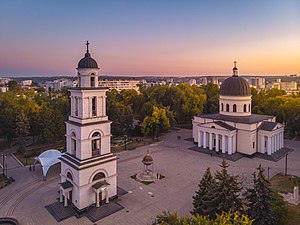
Back Θρησκεία στη Μολδαβία Greek Religion en Moldavie French Religija u Moldaviji Croatian Կրոնը Մոլդովայում Armenian Religioni in Moldavia Italian Религија во Молдавија Macedonian Religia w Mołdawii Polish Religião na Moldávia Portuguese Religia în Republica Moldova Romanian Религия в Молдавии Russian

| Part of a series on the |
| Culture of Moldova |
|---|
 |
| People |
| Mythology |
| Festivals |
| Religion |
| Literature |
| Music |
| Sport |
Moldova's constitution provides for freedom of religion and complete separation of church and state, though the constitution cites the "exceptional importance" of Eastern Orthodox Christianity.[1] Discrimination on the basis of religious affiliation is illegal, and incitement to religious and ethnic hatred was made illegal in May 2022.[1] Religion in Moldova is dominated by the Eastern Orthodox branch of Christianity. According to the 2014 Moldovan census, 90 per cent of the country reported to be of the Eastern Orthodox Christian faith.[2] Of this number, around eighty to 90 per cent of Orthodox Moldovans belong to the Moldovan Orthodox Church (formally known as Metropolis of Chișinău and All Moldova) which is subordinate to the Russian Orthodox Church, and has played a powerful role in deepening Russia's influence in Moldova.[1][3] The remaining 10–20 per cent of Orthodox Moldovans belong to the Metropolis of Bessarabia, which is subordinate to the Romanian Orthodox Church.[1]
Of the non-Orthodox population of Moldova, the United States Department of State estimates that as of 2022 approximately seven per cent identify with no religion; Baptists, Jehovah's Witnesses, and Pentecostals number between 15,000-30,000 each; the Jewish Community of the Republic of Moldova organisation estimates the Jewish population to be approximately 20,000; and the Islamic League of Moldova (an NGO recognised by the Moldovan Ministry of Justice in 2011 as representing Moldovan Muslims[4]) estimates the number of Muslims to be between 15,000–17,000.[1] There are six synagogues in Chișinău, one in Orhei, one in Soroca, and one in Tiraspol, and one mosque in Chișinău. The remaining less than five per cent of the Moldovan population are Seventh-day Adventists, Evangelical Christians, Roman Catholics, Lutherans, and atheists.[1] The Transnistrian authorities estimate that 80 per cent of the population belong to the Moldovan Orthodox Church.[1]
The 1992 Law on Religions, which codifies religious freedoms, contains restrictions that inhibit the activities of unregistered religious groups. Although the law was amended in 2002, many of the restrictions remain in place. The law provides for freedom of religious practice, including each person's right to profess his or her religion in any form. It also protects the confidentiality of the confessional, allows denominations to establish associations and foundations, and states that the Government may not interfere in the religious activities of denominations. The law specifies that "to organize and function", religious organizations must be registered with the Government, and unregistered groups may not own property, engage employees, or obtain space in public cemeteries in their own names.
- ^ a b c d e f g "2022 Report on International Religious Freedom: Moldova". United States Department of State. Retrieved 2023-08-03.
- ^ "Population and Housing Census in the Republic of Moldova, May 12-25, 2014". National Bureau of Statistics of the Republic of Moldova. Retrieved 2023-08-03.
- ^ Luchenko, Ksenia (2023-01-31). "Why the Russian Orthodox Church Supports the War in Ukraine". Carnegie Endowment for International Peace. Retrieved 2023-08-03.
- ^ "Moldovan Muslim Leader 'Disappointed' By Anti-Islamic Remarks". Radio Free Europe/Radio Liberty. 2011-04-28. Retrieved 2023-08-03.
© MMXXIII Rich X Search. We shall prevail. All rights reserved. Rich X Search